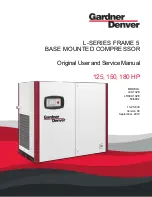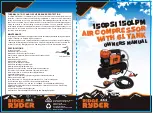
8
compatible with petroleum based products. If you suspect that a
material is not compatible with petroleum products, an air line filter for
removal of moisture and oil vapor in compressed air is required.
N O T E : Always use an air line filter to remove moisture and oil vapor
when spraying paint.
Location
C A U T I O N : In order to avoid damaging the air compressor, do not
allow the unit to be tilted more than 10˚ when operating.
Place air compressor at least 3 feet away from obstacles that may
prevent proper ventilation. Keep unit away from areas that have dirt,
vapor and volatile fumes in the atmosphere which may clog and gum
up the intake filter and valves, causing inefficient operation.
HUMID AREAS
In frequently humid areas, moisture may form in the bare pump and
produce sludge in the lubricant, causing running parts to wear out
p r e m a t u r e l y. Excessive moisture is especially likely to occur if the unit
is located in an unheated area that is subject to large temperature
changes. Two signs of excessive humidity are external condensation
on the bare pump when it cools down and a “milky” appearance in
compressor lubricant. You may be able to prevent moisture from
forming in the bare pump by increasing ventilation or operating for
longer intervals.
NOISE CONSIDERATIONS
Consult local officials for information regarding acceptable noise levels
in your area. To reduce excessive noise, use vibration mounts or
silencers, relocate the unit or construct total enclosures or baffle walls.
Contact a D
E
WA LT service center or call 1-800-4D
E
WA LT for
a s s i s t a n c e .
TRANSPORTING:
WARNING: Unit weighs more than 160 lbs. Do not move or lift
without assistance.
When transporting the compressor in a vehicle, trailer, etc. ensure that
the tanks are drained and the unit is secured and placed on a flat
horizontal surface. Use care when driving so to avoid tipping the unit
over in the vehicle. Damage can occur to the unit or surrounding items
if unit is tipped. Use a ramp if loading or unloading the unit from a
height of more than 12”.
MOVING:
When moving the unit into a position for use, grasp handle grips at rear
of compressor, and lift compressor high enough so unit can be rolled
on the front tire.
WARNING: Ensure proper footing and use caution when rolling
compressor so that unit does not tip or cause loss of balance.
When location is reached slowly lower rear of compressor to ground.
A LWAYS STORE COMPRESSOR IN A HORIZONTAL POSITION,
ON ALL FOUR RUBBER MOUNTS.
NOTE: Should the unit tip over, hard starting and smoking will occur
due to oil spillage.
Air Inlet Filter
C A U T I O N : Do not operate without air inlet filter
General Requirements
The piping, fittings, receiver tank, etc. must be certified safe for at
least the maximum working pressure of the unit. Use hard welded or
threaded steel or copper pipes, cast iron fittings and hoses that are
certified safe for the units discharge pressure and temperature. Use
pipe thread sealant on all threads, and tighten joints thoroughly to
prevent air leaks. DO NOT USE PVC PLASTIC.
CONDENSATE DISCHARGE PIPING
If installing a condensate discharge line, the piping must be at least one
size larger than the connection, as short and direct as possible,
secured tightly and routed to a suitable drain point. Condensate must
be disposed of in accordance with local, state and federal laws and
r e g u l a t i o n s .
N O T E : All compressed air systems generate condensate that
Gas Manual 10-5-01 2/10/03 2:31 PM Page 8












































